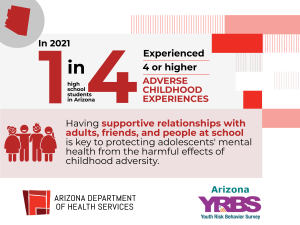 Childhood experiences like abuse, neglect, or household dysfunction – also called Adverse Childhood Experiences or ACEs – can have a lasting impact on children’s and adolescent health and well-being.
Childhood experiences like abuse, neglect, or household dysfunction – also called Adverse Childhood Experiences or ACEs – can have a lasting impact on children’s and adolescent health and well-being.
The good news is that having people who care about them, including friends, school staff, and other adult mentors, can help lessen the negative effects of ACEs and improve overall mental health.
Having people to turn to for comfort and support is one of the crucial benefits of having supportive relationships. When times are tough, having someone to talk to about feelings can make all the difference. This is especially important in the context of the COVID-19 pandemic, which has caused many people to feel heightened stress and isolation.
The most recent 2021 Arizona Youth Risk Behavior Survey, which reached 1,181 adolescents from ninth to 12th grade, found that 40% of participants felt that their mental health was not good during the pandemic, while 36% reported poor mental health in recent times.
The survey also showed a quarter of adolescents in Arizona have thought about taking their own lives in the past 12 months.
Nearly seven out of 10 of the youth surveyed had at least one Adverse Childhood Experience, and two out of 10 had four or more ACEs. Adolescents with four or more ACEs were found to be six times more likely to have poor mental health during the pandemic and 18 times more likely to consider suicide compared to peers with no adverse experiences.
 Results from the survey also show what a difference positive relationships can have on adolescents’ lives, particularly those with more adverse experiences. When adolescents had at least one supportive relationship with peers, adults, or people at school, the proportion who reported poor mental health decreased significantly.
Results from the survey also show what a difference positive relationships can have on adolescents’ lives, particularly those with more adverse experiences. When adolescents had at least one supportive relationship with peers, adults, or people at school, the proportion who reported poor mental health decreased significantly.
We have put together new interactive dashboards that compile data related to ACEs statewide and from multiple sources. Check out all the data and information offered, with some highlights including:
- The percentage of adolescents with four or more ACEs who reported poor mental health during the pandemic decreased from 74% to 53%.
- The percentage of those reporting poor mental health in recent times has lessened from 75% to 53% when they had at least one supportive relationship in their lives.
- Additionally, there was a reduction in the percentage of individuals reporting suicidal ideation, which dropped from 61% to 39%.
Supportive relationships with friends, family, and school personnel can help youth with Adverse Childhood Experiences overcome the negative effects of their past experiences. In times of uncertainty like the COVID-19 pandemic, these relationships are more important than ever, providing comfort, hope, and a sense of security.
The ADHS Bureau of Women’s and Children’s Health is a proud part of a Collaborative Improvement and Innovation Network (COIIN) in a Youth Mental Health Task Force to help integrate mental health into our adolescent health initiatives.
The Youth Mental Health Task Force recently launched a stigma reduction website with the help and creative input from Bring Change 2 Mind youth. The site was developed for youth, providing tips for self-care and how to have conversations about mental health with parents, various mental health resources, and a listing of therapists, as well as other resources. A youth stigma reduction campaign was also developed to spread awareness to youths.
To further support mental health efforts, the task force launched the most recent bilingual bullying prevention “What Kind are You” campaign for youth 13 to 15 years of age, focusing on mental health, wellness, and respect for peers. The message given was to be accepting of others, their choices, their lifestyles, and their bodies, and to simply be kind.
Using federal and state funding, the bureau will continue implementing the Youth Mental Health First Aid program in partnership with county health departments, community-based organizations in all 15 Arizona counties, and the Inter-Tribal Council of Arizona.
Youth Mental Health First Aid teaches parents, family members, caregivers, teachers, school staff, peers, neighbors, health and human services workers, and other caring citizens how to help an adolescent aged 12 to 18 experiencing mental health challenges, addiction, or life crisis.
The full infographic with additional information can be found here.
View previous ADHS reports on Adverse Childhood Experiences and Positive Childhood Experiences and visit the Adverse Childhood Experiences website for detailed information.










